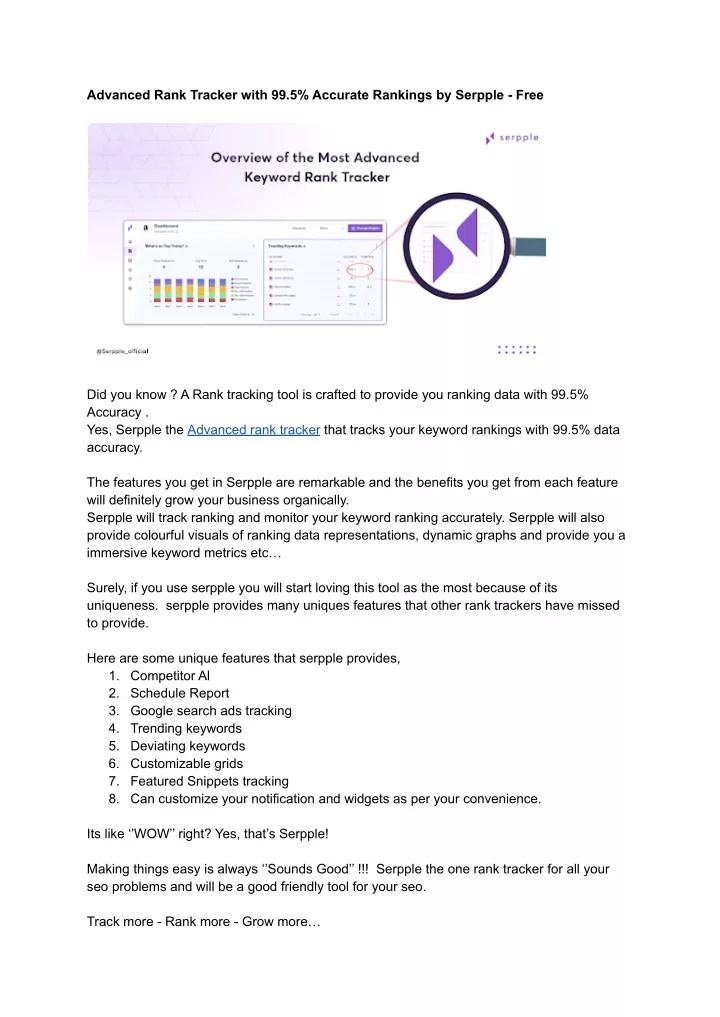In the ever-evolving landscape of digital marketing, having a reliable rank tracker accurate is vital for businesses aiming to maintain their online presence. As search engine optimization continues to be a cornerstone of effective digital marketing strategies, understanding how well a website ranks for specific keywords becomes paramount. A rank tracker is a tool that quantifies this by providing insights into keyword rankings, enabling marketers to assess their performance, identify areas for improvement, and adapt their strategies accordingly.
The accuracy of a rank tracker can significantly impact decision-making processes. Marketers rely on precise data to craft tailored content, optimize pages, and ultimately drive traffic to their sites. However, not all rank trackers are created equal, and the challenge lies in distinguishing which tools provide the most accurate and actionable insights. This article delves into the nuances of rank trackers, highlighting what makes a rank tracker accurate and how to choose the best one for your needs.
As businesses continue to compete for visibility on search engines, the importance of an accurate rank tracker cannot be overstated. From small startups to large enterprises, understanding where you stand in the search results can influence marketing budgets, content strategies, and overall business growth. In this article, we will explore the key features of an accurate rank tracker, assess popular tools available in the market, and answer common questions surrounding rank tracking.
What Is a Rank Tracker and How Does It Work?
A rank tracker is a software tool that monitors a website's position on search engine results pages (SERPs) for specific keywords. By tracking these rankings over time, businesses can gauge the effectiveness of their SEO strategies. Rank trackers work by regularly checking the SERPs for specified keywords and logging the rankings, often providing visual data representations such as graphs and charts to illustrate changes over time.
Why Is Accuracy Important in Rank Tracking?
Accuracy in rank tracking is crucial for several reasons:
- Informed Decision-Making: Accurate data allows businesses to make data-driven decisions regarding their SEO strategies.
- Competitive Analysis: Understanding where your competitors rank can help you identify gaps and opportunities within your own strategy.
- Performance Measurement: Accurate rank tracking enables the measurement of SEO efforts over time, helping to assess the return on investment (ROI) of various campaigns.
- Resource Allocation: With precise rankings, businesses can allocate resources more effectively between different marketing channels and strategies.
What Features to Look for in an Accurate Rank Tracker?
When evaluating a rank tracker for its accuracy, consider the following features:
- Data Source: The rank tracker should pull data directly from search engines to ensure accuracy.
- Tracking Frequency: Look for tools that allow you to track keyword rankings daily or weekly for up-to-date insights.
- Geolocation Tracking: The ability to track rankings based on specific locations can enhance accuracy, especially for local businesses.
- Custom Reporting: Features that allow you to customize reports can help you focus on the metrics that matter most to your business.
Which Rank Tracker Tools Are the Most Accurate?
There are numerous rank tracker tools available, each with its unique features and capabilities. Some of the most popular and accurate rank tracker tools include:
- SEMrush: Known for its comprehensive SEO toolkit, SEMrush offers accurate keyword tracking along with additional features for site audits and competitor analysis.
- Ahrefs: This tool is renowned for its vast link database and provides precise rank tracking capabilities alongside insightful keyword research tools.
- Serpstat: With its user-friendly interface, Serpstat offers reliable rank tracking and various SEO tools, making it suitable for businesses of all sizes.
- AccuRanker: As its name suggests, AccuRanker prides itself on delivering accurate keyword rankings with real-time updates and detailed reporting options.
Can You Rely on Free Rank Trackers for Accurate Data?
While there are free rank tracking tools available, their accuracy can often be questionable. Free tools may not provide the same level of detail or frequency of updates as paid options. They may also rely on limited data sources, which can compromise the precision of the rankings they report. For businesses that depend on accurate data to inform their marketing strategies, investing in a reputable paid rank tracker is often worth the cost.
How Often Should You Check Your Rankings?
The frequency of checking rankings can vary based on your business needs and the competitiveness of your industry. Here are some general guidelines:
- Daily Tracking: Suitable for highly competitive industries where rankings fluctuate frequently.
- Weekly Tracking: Ideal for businesses that want to monitor trends without overwhelming themselves with data.
- Monthly Tracking: Works well for less competitive niches where significant changes in rankings are less common.
How to Improve Your Keyword Rankings?
Improving keyword rankings requires a multi-faceted approach. Here are some strategies to consider:
- Quality Content Creation: Develop high-quality, relevant content that addresses the needs of your target audience.
- On-Page SEO: Optimize your website's on-page elements such as title tags, meta descriptions, and header tags.
- Link Building: Focus on building high-quality backlinks from reputable websites to enhance your website's authority.
- Regular Updates: Keep your content fresh and up-to-date to maintain relevance in search results.
Conclusion: Why Invest in an Accurate Rank Tracker?
Investing in an accurate rank tracker is essential for businesses looking to enhance their online visibility and drive traffic to their websites. The insights gained from a reliable rank tracker can inform strategic decisions, optimize SEO efforts, and ultimately lead to better business outcomes. As the digital marketing landscape continues to evolve, having precise tracking tools in place will empower businesses to stay ahead of the competition and achieve their goals.




